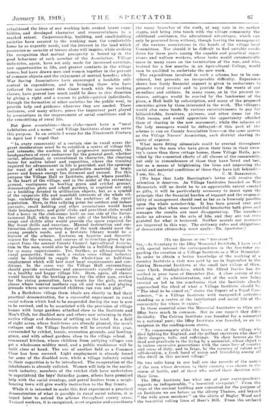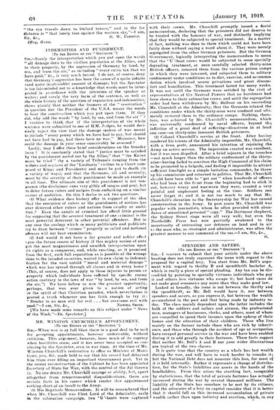[To THE EDITOR sr THE " SPPCTATOH"] 8111,—As Secretary to
the Tilley Memorial liatitute, I hove read with special interest the correspondence in the Spectator re- garding the creation of a Village Institute os n War Memorial. In order to obtain a better knowledge of the working of a country Institute a visit was paid by me in September to the Ceiriog Memorial Institute at the small fair village of Glyn, near Chirk, Denbighshire, which Sir Alfred Davies has de- scribed in your issue of December 21st. A close surrey of the building, of its administration. and of the work now being carried on led to the ooneltneion that the Institute closely approached the ideal of what a Village Institute should be. "Tim ideal to be aimed at," states the Report of a Royal Com- mission, "is a Village Institute with manyssided notivities standing as a centre of the intellectual and social life of the community for whom it exists."
In those essential aims the Memorial Institutes at. Glyn awl Utley have much in common. Bet in one respect they differ decidedly. The Ceiriog Institute was founded for a memorial to a national poet; the Iffiey Institute was founded, as an in- scription in the reading-room states,
" To commemorate alike the brave sons of the village who died fighting for England, and the gallant survivors who shared their dangers, toils, and sufferings. To show honour .to the dead and gratitude to the living by a 'memorial, whose abject is to imbue successive generations with the same love of country and sense of duty, and to forge, by the memory of valour and self-devotion, a fresh bond of union and friendship among all who dwell in this ancient village."
On two rolls hung in our hall are the records of the name. of the men whose devotion to their country- was shown in the storm of battle, and of those who sealed their devotion with their lives. The lffiey Institute hae what one of your correspondents regards as indispensable, "a beamtiful viewpoint." From the steps of the ancient building sow converted for the purpose of an Institute we see before as the silvery Thames, and beyond "the wide grass meadows" on the skirts of Bagley Wood and the beautiful rolling lines of Boar's Hill. From the orchard
" the eye travels down to Oxford towers," and in the far distance is " that lonely tree against the western sky,"—I am,



































 Previous page
Previous page